#this meme could have been an essay
Text
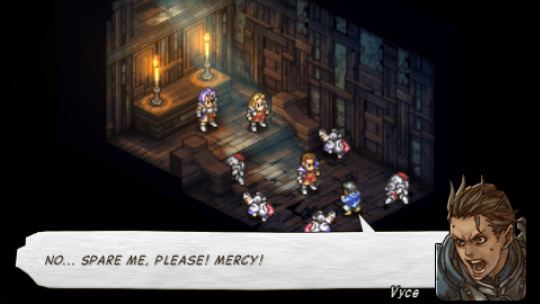

#tactics ogre#let us cling together#space-spring liveblogging#every time I make an actual photo-with-text meme for these posts I think to myself 'I'm spending too much time on this'#but I've discovered the power of online meme makers and there's no going back#anyways!! I could write a whole other essay about the reasons villains/morally gray characters are so fun to me#but a lot of it boils down to: they usually want something that I as a human also want (love or admiration or freedom etc. etc.)#but they're just willing to cross any line to get it#so I think there's always a part of my mind that's like. dang. they're not GOOD people per se#but if they. if they just had gotten the chance to see things a little differently or had been shown just a little kindness#then they might have been heroes too#and I just feel things about it!!!!!!!!#and with tactics ogre especially I think that's exactly what the lawful route ends up looking at#so I'm just. gonna keep doing a thumbs up until I get around to that
18 notes
·
View notes
Text

#bitches really hear ''Be kind to me be kind and wait it out'' & ''Getting a life is a little like dying'' and cry (it's me I'm bitches)#I know the song has been out for a few weeks now but inspiration struck to make a low effort meme#Do people hate AJR because they have such relatable songs? Each song is a story of their own and Jack said they're trying to write a song-#about nearly every issue in life like this one is about growing up but still internally feeling young and feeling stuck in life-#and being left behind by your peers while you struggle and just try to ''grow up'' and the fears of becoming an adult#listen I could write an essay over AJR's music and nearly all of their songs I fucking love them so incredibly much#ajr#the dj is crying for help#ajr meme
36 notes
·
View notes
Photo


i was tagged by @aartyom to make some of my ships in this picrew sadly my entire brain short circuited after doing meldesh bc thats the only ship i think of 24/7. if u see me revisit this meme later, pretend this post doesnt exist and the new one does
melchior x nadesh - original
tagging: ROARS IM NOT SURE @katsigian @yelannaise @vilestblood @lunarlegend
#taggedfarllee#im so useless with all the memes ive been tagged in lately i have a hoard i wanna do#brain wont push out the info tho SHAKES IT RETURN TO ME MOTIVATION#anyway i could write essays about these two at all times tho#like. at. all. times.#there is no other ship in my brain that matters more#im v normal about my lil guys
5 notes
·
View notes
Text
you ever love a piece of media and wanna talk about it but refuse to interact with other fans? like youll meet one and instantly be like... no you dont get it. i dont like it the same way you do.
#txt#literally all of my interests are only liked by filmbros and people with ao3 brainrot it makes me wanna inhale microplastics#ive been trying to not be as much of an elitist about it but...#i have never met an hxh fan outside of this website who actually... gets hxh.#or like. i could write an essay on the meaning of american psycho. that does not mean i wanna see your fucking sigma bale memes.#or when people automatically assume my hyperfixations are comfort medias#no these are brain parasites. i have no comfort characters or ships. i hate everyone in this.#<- breaking bad lmao.
3 notes
·
View notes
Note
i'm so confused rn, can you explain the goncharov thing?? i get off tumblr for five minutes
(Edits closed as of 28 Nov.)
Lmaoooo
Nah I getchu. So this post has been circulating for like two years:
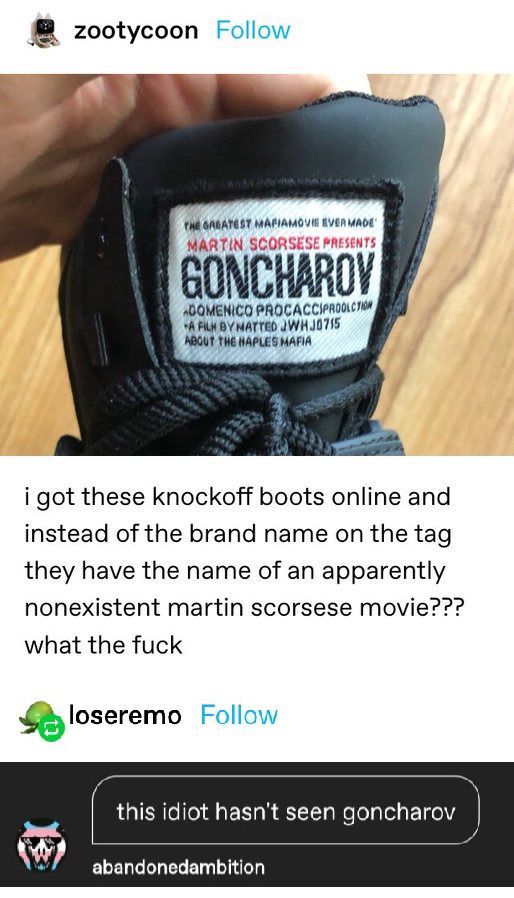
Link to post.
But yesterday, it had inspired someone to do this:
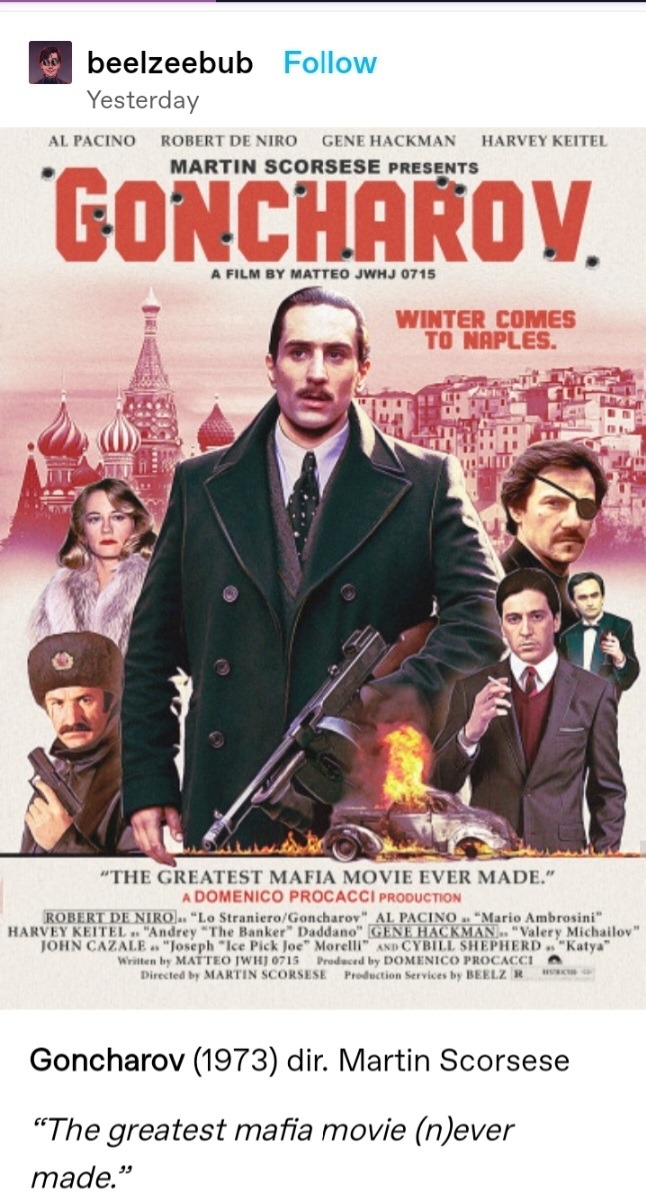
Link to post.
Next thing I knew there were fake Letterboxed reviews.
Goncharov moodboards. Really good ones.
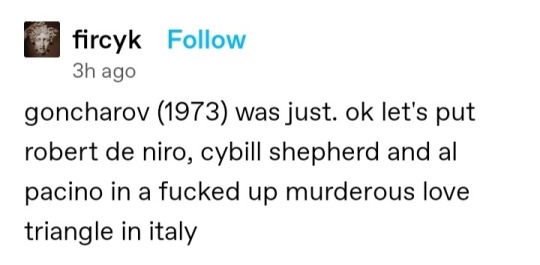
Link to post.
Meta analysis. So many fake meta essays. Disturbingly good ones. And of course the memes. (Edit: HAVE I SAID THIS SHIT IS DISTURBING)
As you can see, the myth just started to grow, characters and ships and tropes being added one after the other, almost bizzarely without contradiction, until there was enough of shape to the whole thing for people to start posting fanfic about it on AO3. "No beta we die like ice-pick Joe" is already a tag.
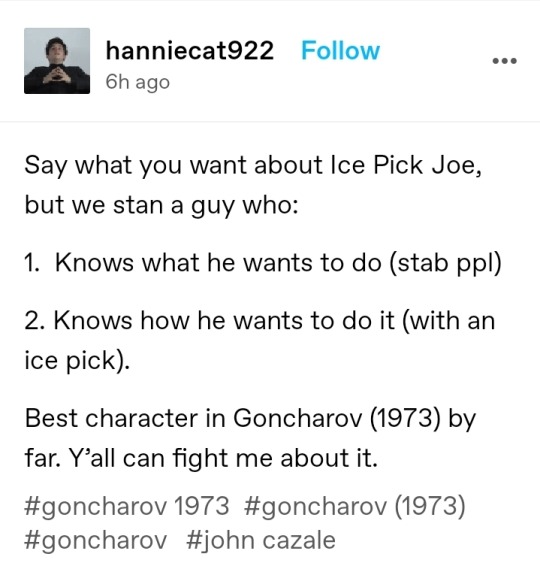
Link to post.
It was hilarious in the beginning, but the way it's developed within less than a day, kind of like it's being willed into existence, is freaking me out a bit. We're toying with powers beyond our comprehension. 😂😂😂
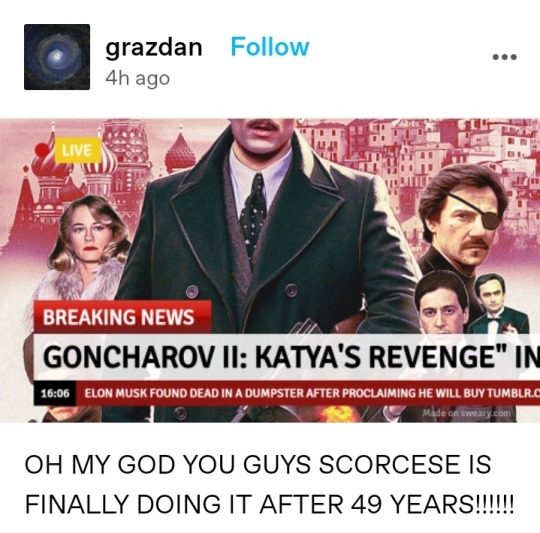
Link to post.
Of course, there could be an ulterior motive as well.
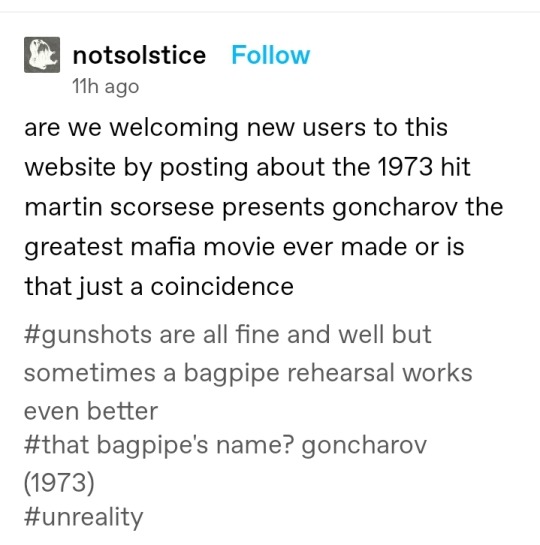
Link to post (tags mine).
Edit: guys, please tag these posts "unreality" so people with disassociation issues can filter them out (not this one, this is an explainer). <3
----------------------------------------------
Edit 2: Aparently the boots in the original post are actually referring to a movie called Gomorrah that came out in 2008, directed by Mateo Garrone, based on the Scampia Feud. And other people had also been making posts about the fake movie for a while before the poster took off.
found by @thepotch
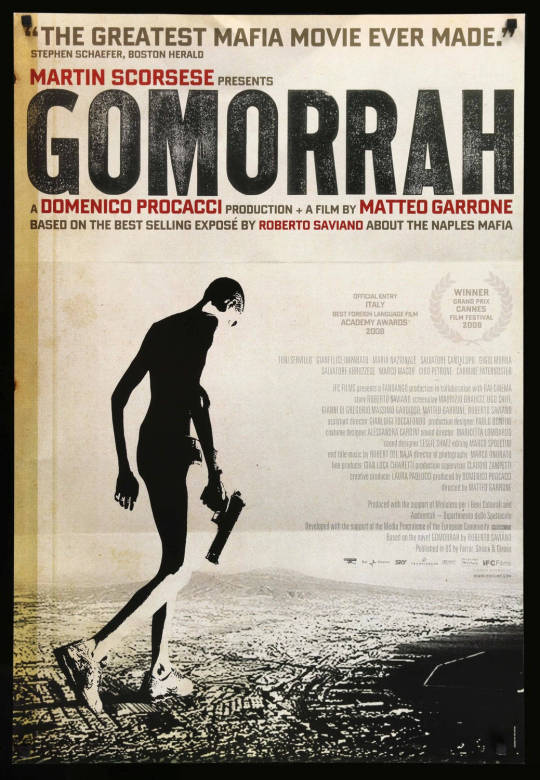
Edit 3: Explainer: why did those boots have this movie on them anyway?
Edit 4: Alt text added to all images courtesy of @valentineish ❤️
Edit 5: Turns out tumblr has done this kind of thing before. Nine years in this hell place and I had to have "Squiddles" and penis smp explained in the replies.
Edit 6: This post collects the Lore so far.
Edit 7: Lynda Carter (real one)/ earns more/ Tumblr cred.
Edit 8: Holy shit y'all we have the theme music. With sheet music. And it's on Spotify!
Edit 9: THERE IS A TRAILER WITH THE THEME MUSIC
----------------------------------------------
I made this post 18 hours after the movie poster went up. Closed edits 27 hours after first posting. So all of the above happened within 45 hours of the movie poster going up.
Edit 10: Google document live-compiling all the lore so far (Day 3)
Edit 11: Masterpost of Goncharov soundtracks (Day 3)
Edit 12: Entertainment news articles covering the Gonch-posting (real) (Contd from yday)
Edit 13: The music from the masterpost all compiled into a 31-minute original score with video edits on YouTube (edit: unfortunately taken down)
Edit 14: Staff's Goncharov art showcase for Tumblr Tuesday
As of closing on Day 3 there are 371 works in the AO3 tag.
-----
Updating with Day 3 shenanigans I missed yesterday:
Edit 15: Goncharov TV Tropes page
Edit 16: Ethics of Gonchposting
Important PSA 1 (how to reduce harm to Tumblr's neurodivergents)
Important PSA 2 (reality affirmation, anti-bullying)
Important PSA 3 (why you should stop trying to vandalise legit information sites)
Edit 17: Character lore from beezlebub whose poster they originated from
Edit 18: What we know about/ Director Matteo JWHJ0715 (#unreality)
Edit 19: Link to post with screenshotted and described NYT article (scroll down) and this golden exerpt from BuzzFeed: 💀
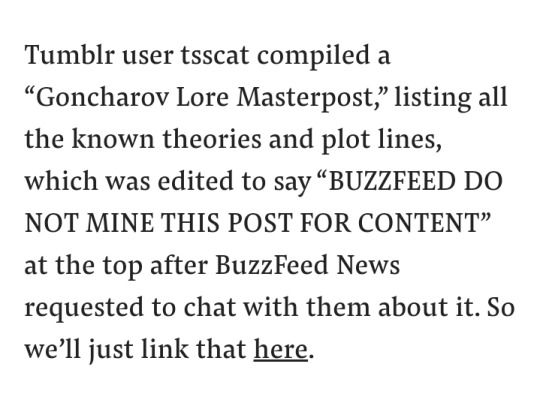
(alt text included)
End of Day 4 there are now 485 works in the Goncharov tag on AO3
----
Didn't get to update this on Day 5, so these are the Day 5 doings:
More trailers!
Trailer 1 (My favourite)
Trailer 2
Trailer 3
Trailer 4
I also just found out about the Goncharov Game Jam.
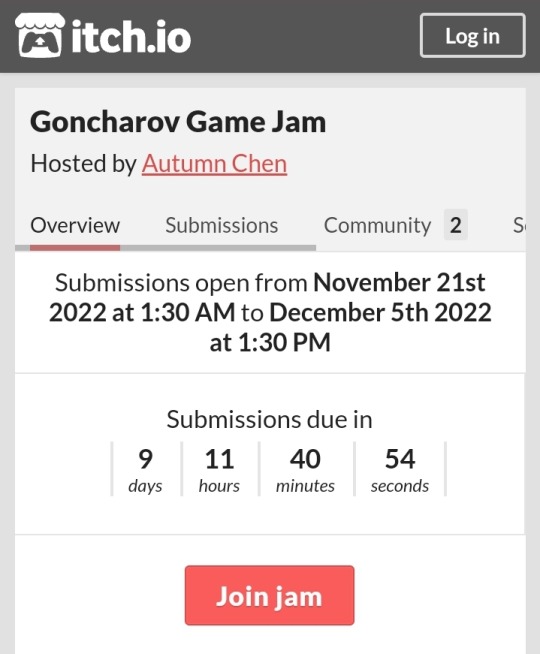
It appears this opened a day after after the meme took off.
Goncharov was first entered into Wikipedia between Day 4 and 5 (attempts to vandalise it with fake info don't count, incidentally – please knock that shit off) under List of Internet Phenomena. This was then expanded into its own Wikipedia page at the end of Day 5 because, according to the talk history: "the topic now meets the notability threshold for its own artice due to significant coverage in The New York Times and other sources cited." We're on Wikipedia, people!
And then we made The Guardian half a day later. So while the meme is definitely dying down to embers by now, it still stays winning.
YouTube channels with episodes on the meme:
InformOverlord (4:30)
Lessons in Meme Culture (2:43)
End of Day of 5 there were 511 works on AO3, and End of Day 6 (today) there are 556.
--
🚨BREAKING 🚨 from Martin Scorsese's daughter's TikTok (real actual)
tw: unreality:
We did it you guys!
Clarification: Francesca Scorcese asked her Dad about the meme and Martin played along. Please reblog this PSA to help Tumblr people with psychosis. Thanks.
Final edit: Day 8. Media reactions to Scorcese's TikTok (everyone from Forbes to Vulture). That one Tumblr user who said they'd do a screenplay if their post got notes has promised to shoot a single scene, but please don't be dicks just because you reblogged it; leave them alone until they get around to it themselves. As of end of Day 8 there are 609 works in the AO3 tag. I love all you lunatics. Peace! ❤️
#goncharov 1973#reasons i can never leave this hellsite#we've ascended from pirating criterion movies to straight up manifesting them into existence#get on our level twits#knee of huss#goncharov#tumblr lore#tumblr memes#tumblr culture
62K notes
·
View notes
Text
I still think about that girl who accidentally talked to Nazis at a Palestine rally. It's been dissected and memed to death already, but one point of her bafflingly long essay sticks out to me and I haven't seen people really talk about that aspect of it.
She mentioned her burning need to finally do something about Gaza, that's why she's taking a stand and organizing and getting out there and protesting, right? And yet she starts her essay mentioning that she has KLANSMEN in her extended family and they're a deeply entrenched part of the South where she lives. And I just nodded skeptically because wait wait wait wait wait!
You mean to tell me that a war happening a world away, which does not affect you aside from how much social clout you'll have among your online leftie friends, is important enough to start protesting and organizing and "resisting" for. But you have done nothing about the Klan?? That's just presented as a status quo, they've always existed where you live and always will. Sorry that's just how it is now let's move on?
You could be actually trying to dismantle the KKK in your region, for what little you can actually contribute to that, it's still much more tangible and direct than marching up to a Jewish owned business and shouting "From the River to the Sea!" I think it really speaks to something about White American Leftists. I'm not sure what yet, but I'll let you know. Maybe it's their delusion that they're not "safe," combating injustice so they pick on Israel because truly Israel and Israelis do not care about them. They're gnats.
But according to these WALs, a Jewish state, flawed as it is, merely existing and engaging in combat with its hostile neighbors, is more of a threat, more of a yearning cry for justice, than the Ku Klux Klan?? I know those creeps haven't just been idling by twiddling their thumbs in the post Obama era either. After Charlottesville? No no no, you just don't want to confront your own complicity in White Supremacy (considering you have family in the Klan??). You don't want to disrupt the tenuous truce between the various political factions of your family at Thanksgiving.
But you're gung-ho full steam ahead calling for the largest Jewish community on Earth to lose their sovereignty and possibly their homes, maybe even their lives, and you just don't see an issue with that. You're delusional, you're narcissistic, and you're lazy and immature. You're every bit as pathetic as your conservative father tells you you are.
707 notes
·
View notes
Text
i had a post in the works talking about some of my personal life shit and the things i'm looking to do with rekindled this year to help make personal life shit easier aaand then i fell asleep for a nap and when i woke up Rachel announced that LO was ending in less than 10 episodes ??

sooo yeah i'm officially saving that post for later, because LO is officially ending, with an actual end date. It does mean that it's not ending at the start of Spring like my initial prediction, which is a bummer (because that would have been really cool LMAOOO) but it does mean it gets to go on long enough to resolve the current plot arc. As for every other plotline in the story... yeah, those aren't getting wrapped up, at least not in any way that could be satisfying.
For over the last year LO has been a series of "wait seriously???" and this is yet another, though it's kind of different this time. We knew the end was coming and practically begging for Rachel to pick an end date because for many, following along with this comic has become a Sisyphean task week after week. It's bittersweet in a way, but . . . I also kinda don't feel anything? Maybe it's just my 'tism, maybe it's just the fact that I'm so tired of following this series, but I just... don't feel joy, but I don't feel dread. It's ending and that's that. As all things come and go in life, some day there won't be any more LO, and that day is May 11th.
I will miss the weekly readalongs that I would do with pals, the memes we'd make out of the new material, but I don't think I'm going to miss the comic and everything it said and did. At this point reading LO feels like watching a horse struggle to breathe and you're just begging the farmer to put it out of its misery, but the farmer thinks "No no, it'll be fine! It'll get back up in no time!" and it's like... no, it desperately needs to be put to rest 💀
I still have my two drafts stowed away, both on opposing sides of the fence depending on how LO turns out-
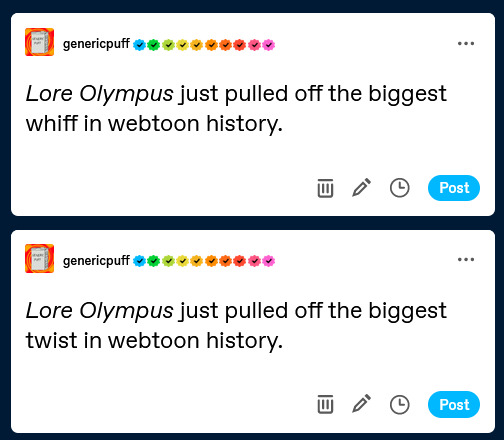
-and now we finally have an end date on when those essays will be written.
I don't know how I feel yet about it ending. These are complicated feelings to sort through regarding a comic that's basically been my life for the last few years, even before I turned into a critic of it. I'm just glad there's a light at the end of the tunnel. And I'm glad even my "love to hate it" energy has been waning on it the past few weeks anyways so that the end of it all can feel as painless as possible LOL Don't get me wrong, there will still be plenty to discuss after the comic, I don't think the antiLO/ULO community will just disappear into a puff of smoke as soon as LO is over, but I think a lot of us are also equally relieved that the comic made it this easy to stop reading and that it now has an end point.
And most of all, I'm hoping that whatever ending the comic brings, even if it just winds up being the S2 finale all over again for the critics, is still satisfying for the fans who have stuck around with it this long. The people who have loved this comic through it all at least deserve a proper send-off and I really hope Rachel gives it to them.
As for me... I'm not going anywhere, but it's been nice to stuff the overflowing clothes of LO back into its drawer within my brain. I want to make room for other drawers, other things, other pieces of work that will undoubtedly bring me more joy and entertainment. I don't know what yet, but it's nice to know the drawers aren't overflowing anymore.
And that's all I'm gonna say on that.
255 notes
·
View notes
Text
What I think your favourite sonic character says about you!
Sonic- you need therapy
Tails- Your an older sibling who feels 6 years old in their 20’s
Knuckles- you complain that nobody appreciates him enough. And you’d be correct.
Amy- you could give me a 3 hour video essay on an oddly specific historical subject and you’d have my full attention
Cream- you say you don’t like kids but then you cry every time you see a kid in fiction because you’re scared that anything or everything bad will happen. (the embodiment of that “if anything happens to them I’ll kill everyone in this room and then myself” meme)
Big the cat- you scare me in a way that shouldn’t even exist
Shadow- You are so right (please kiss me on the mouth)
Rouge- you ether like her way to much. Or you like her way to much.
Omega- haha. Bomb.
Silver- You believe you’d be able to win a fight against anyone who would make fun of your friends, but would cry if you had to make plans over the phone.
Blaze- your handwriting and craftsmanship with making art and stories always comes to amaze me. Like you know when you join a fandom and see the most breathtaking fic or art. Like how is it not in a museum, or a best selling novel, that’s how I feel about your art/writing.
Metal- ok you’re a NERD nerd. Like you’ve been a fan of sonic since you were 8, you played a lot of the games, you own at least a couple comics and figures. This franchise is ingrained in your BLOOD.
Eggman- wow that’s really interes- *pepper-sprays you in the eyes*
Charmy- you were either the really annoying kid and proud, or stuck using millennial/ tumblr slang 24/7, Or both.
Espio- what’s it like only shipping rear pairs
Vector- your to swag to exist. Like there are at least 50 people you’ve had minor interactions with in real life who now have that interaction in their long term memory just because of how cool you were. What are you even doing here man? Go outside!
#sth#sonic the hedgehog#miles tails prower#knuckles the echidna#amy rose#cream the rabbit#big the cat#shadow the hedgehog#rouge the bat#e 123 omega#team dark#team sonic#the chaotix#espio the chameleon#charmy bee#vector the crocodile#relatable
193 notes
·
View notes
Note
Hi :) I read The Tragedy of Heterosexuality and loved it — do you have any other books you’d recommend about gender/sexuality? Thanks <3 I love reading your long posts, you have really insightful ideas and I think we view the world very similarly
Glad to hear that! Here's some context for anyone not in the loop: The Tragedy of Heterosexuality is a book about Heteropessimism, or rather, finding a way out of it. The notion is that heterosexual love is doomed because men and women are just different by nature, and it manifests through relationship self-help books, incels and pickup artists, and the memes and ramblings of countless straight women who they wish they could just be lesbians. Jane Ward think heterosexuality as we know it self sabotages through what she calls the misogyny paradox: straight men love women, except they don't love women. But she doesn't think heterosexuality is doomed or prop up political lesbianism as a solution. She calls for mutual respect and actually leaning into the heterosexuality of, well, actually liking each other, rather than try to "queer" it. This is part of a really interesting turn in queer theory where heterosexuality has emerged as a subject of study--another good example is Hanne Blank's Straight: The Surprisingly Short History of Heterosexuality.
So I want to start out by disclaiming I'm not actually that well read. This is something I've been trying to work on more recently. That said, here are some gender and sexuality recs:
Two essays by Gayle Rubin: The Traffic in Women and Thinking Sex. I don't completely cosign everything she says, but these are monumental texts. Thinking Sex is topical especially as the "sex wars" keep playing out.
Gender Trouble by Judith Butler. Everyone's heard of this, so my specific recommendation is to skip to part three and the conclusion, where the text is at its most concise. Butler's theory of gender performativity has exploded beyond their initial reach, so they've since had a lot of interviews and given talks that address a wider audience. People who have read both Gender Trouble and Bodies that Matter tend to recommend the latter text, but I still need to.
The Trouble with Normal by Michael Warner, or if you want a shorter version, his essay "Normaler and Normaler." Even if you're not against marriage in its entirety, his criticisms are so incisive and helpful, especially now in countries where gay marriage was passed but proved to be a dead end. It also really gets into gayness as identity versus behavior, which seems to have exploded into a huge conflict recently. This is how you get people who are on board with queerness in the abstract but appalled by its real-life specifics. I also still need to read Fear of a Queer Planet.
Sister Outsider by Audre Lorde, is a collection of speeches and essays by one of the most influential Black feminist writers. "Uses of the Erotic" especially stuck with me, where the erotic is taken not so literally but as a sort of creative synergy with political implications. If you've ever heard "the master's tools will not dismantle the masters house," that's included in this collection.
Close to the Knives by David Wojnarowicz, also a collection of speeches and essays, is one of my favorite books on AIDS. The rage is palpable and crucial, and the essay "Do Not Doubt the Dangerousness of the 12-inch Politician" is eerily resonant today as politicians still stoke violence on TV (and now social media).
Lately I've been getting more into trans writing, with Transgender History by Susan Stryker and Whipping Girl by Julia Serano. The former alarmed me with how much I didn't know, and the latter blew my mind. It was written at a time when trans people, for better and for worse, weren't really in the public eye except for in niche circles, and academia about trans people was about or at the expense of them but not by and for them. Her mark is so tangible today. My next read will be Reverse Cowgirl by McKenzie Wark after hearing rave reviews. I think I'm going to like it.
I am also accepting recs!
188 notes
·
View notes
Text
My Chemical Romance, Hardcore Sexual Repression, and the Lemon Stealing Whore
[Content warning for non-graphic references to pornography, sex, sexual violence, and negative attitudes towards sex work. There is no explicit nudity but you might not want to read this in front of your boss. All images have descriptions in alt text. See sources here. Read this essay on my Dreamwidth here.]
It’s the setup of a joke: Gerard Way, Mikey Way, Frank Iero, Matt Pelissier, and a porn actress huddle around a leather couch in a dingy room as a camera rolls. The actress, a young and bright-eyed Joanna Angel, asks each member of My Chemical Romance in the room, “Do you guys watch porn?”
Most of us have seen the interview. If not, stop and watch it now, because nothing else I say will make sense otherwise. (And here, just for you, I’ve reuploaded the video with at least 10% more pixels. Watch below, or read a transcript here.)
youtube
The fact that My Chemical Romance, whose faces have decorated shirts at Hot Topic for over fifteen years, whose songs have saved lives and inspired memes, who all have wives and children, would end up associated with an alt porn website like Burning Angel often baffles fans watching the interview for the first time.
For example, see these comments left on the original video uploaded to YouTube:



These comments, though more than a few years old, generally represent how a lot fans understand the interview. Other people think it’s funny and perhaps a little out of left field, but don’t question how four members wound up on a porn site like Burning Angel. Both attitudes are a pretty typical example of the MCR fandom’s ignorance about the New Jersey hardcore scene, as well reflecting general weirdness about sex work.
Since I cannot turn my historian brain off, I wanted to provide some of the extremely interesting historical context behind the video. The post I had originally planned to make very, very briefly outlined how MCR ended up being interviewed by Joanna Angel, founder and longtime CEO of Burning Angel. But the more I looked into it, the more I fell down a rabbit hole. This eventually turned into something of a mammoth manifesto about women and sexuality in the late 90s hardcore scene that gave My Chemical Romance and Joanna Angel careers. I will warn you: this is long. But it’s also important historical background information that rarely gets discussed at all—especially by MCR fans.
(So, with all that said, please feel free to ask any questions about anything I say here! Sources for will be posted on a different post which I will link at the end, and I have been quite thorough, though not as thorough as I could have been.)
Tl;dr: Joanna Angel came up in the exact same scene as My Chemical Romance, Thursday, and Midtown, a scene which stigmatized open sexual expression, at the expense of women and queer people—especially those involved in sex work. When she started her porn site, Burning Angel, she applied the same DIY values that her peers did to their own bands, but faced violence and ostracization from a subculture much too repressed to embrace such blatant expression of female sexuality. In this context, the My Chemical Romance interview with Burning Angel in 2004 was not only a group of guys doing a favor for someone they had probably known for years at that point; it can also be read as a somewhat controversial act that pushed back against this aversion to sexuality, and that helped legitimize and popularize both the site and Joanna Angel’s career.
Burning Angel: the Movie (2005)
Say you’re a diehard My Chemical Romance fan in 2005—if you really want to watch your favorite band discuss their porn-viewing habits, you’ll have to travel to either your local adult entertainment store or go to the hardcore porn site BurningAngel.com and order their first DVD, appropriately titled Burning Angel: The Movie. Once you have the disc, you’ll have to fast forward through several sex scenes and interviews with other bands before you arrive at what you wanted: the actress who you’ve just seen in hardcore sex scenes asking Gerard, Frank, Mikey and Otter questions about their preferences in adult entertainment.
The DVD was Burning Angel’s first attempt at more professional pornography, and Joanna’s first foray into full participation in filmed, live-action sex. Joanna Angel would later go on to be one of the most well-known porn stars of our time—in Virgin Territory (2006), for example, she played a lemon stealing whore; you might have seen the video—and Burning Angel would be credited with the popularization of the “alt” porn genre, which broke from the exploitative mainstream porn model and typically featured models representative of subcultures.

But in 2005 her alt porn empire was still in its infancy, and Joanna was still struggling to rectify her recent full expulsion from the local New Jersey hardcore social scene with her enduring devotion to DIY values—and the fact that members of the sexually repressed subculture that had ostracized Joanna were her site’s target audience.
Joanna Angel on the Scene
Any thoughts of a future career in adult entertainment and the last name Angel were far from her mind when Joanna Mostov enrolled in Rutgers University in 1998.
Though she often pushed back against the wishes of her religious orthodox Jewish family, the extent of her adolescent rebellion had ended at sneaking out to punk shows and getting piercings her mother wouldn’t approve of. At Rutgers, Joanna quickly became enmeshed in the New Brunswick hardcore scene, putting her in the same circles as a host of people whose names you might recognize: Geoff Rickly of Thursday (who ran hundreds of shows out of his basement), Gabe Saporta of Midtown and Cobra Starship, and Alex Saavedra of Eyeball Records.
Geoff Rickly: Well, you know, the funny thing is that, at the time, Joanna, who would later go on to form Burning Angel and become a famous porn star in her own right, was playing in her goth bands with chelsea haircuts and the basement shows. Like, her local goth band would play. And they’d bring out people and stuff, and I’d put touring bands on that show, and so it’s funny to me how, weirdly, DIY punk hardcore scenes and porn had weird associations then. [source: Going Off Track: Geoff Rickly, 2012]
The NJ hardcore scene was close-knit enough that while she only has documented friendships with some of these people, she had to have crossed paths with most of them multiple times (for example, Joanna was at the show on December 31, 1998 where Thursday and Midtown played their first real sets). She went to every show she could and hosted some in her own basement.
While we don’t necessarily have a written record of her friendship with Frank Iero and Mikey Way of My Chemical Romance, the fact that Joanna attended plenty of shows in the North Jersey area and also spent a lot of time at the Eyeball House (Alex was a close friend; and Pencey Prep was on his label) suggests that, at the the very least, Joanna, Frank, and Mikey were aware of each other’s presence in these early years. They were peers in the same scene, just as they were with everyone else who frequented the same venues or played in the same basements.
For years, the hardcore scene mattered to her more than anything else; it was her social life and what she based her values upon.
Those hardcore values and a growing curiosity about her own sexuality lead Joanna to sex-positive feminist activism and a writing internship with Nerve.com, an online magazine which explored topics related to sex and romantic relationships. From there, her interest in expressing her own sexuality continued to develop.
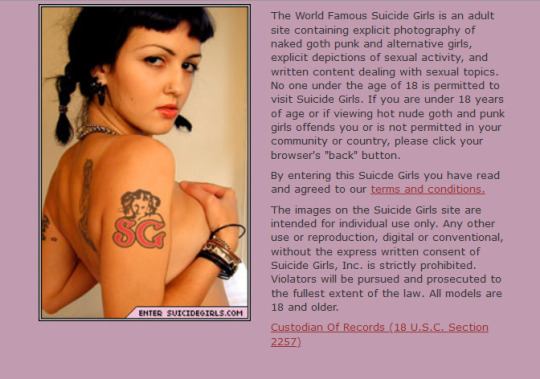
[Suicidegirls in 2001]
So, in 2002, when her roommate and friend asked her if she wanted to start a porn site that offered more explicit content than sites like SuicideGirls, which featured punk aesthetics and band interviews but stayed away from anything more than simple nudity, Joanna agreed.
BurningAngel.com went live in April 2002. It wanted to do things differently than other porn sites. While not necessarily pushing the boundaries of beauty standards, the site used models who were beautiful but in a more approachable, average sense. Joanna has said that since she had little experience even watching porn prior to starting the site, she wanted the site to mimic the kind of sex she was having with actors who looked like the people she was having sex with.
Joanna: When we started the website, it was a reflection of ourselves. It still is to this day. There's band interviews on the website, the style of girl that we use is not your average typical porn star and the personality on the website is a little bit different. All the members interact with each other, all of the girls have blogs and profiles, and people become friends with each other. It's more of a community and a reflection of a subculture rather than just being a website with content to jerk-off to and never think about again. [source: Complex: Interview: Joanna Angel Talks Alt Porn, Piracy, And Her Blow-Up Doll, 2011]

[Burning Angel’s homepage in June 2002]
Hardcore Punk Reacts to Hardcore Porn
Her longtime involvement in the scene and her application of DIY ethics to her porn business did not mean that the hardcore culture actively nurtured Joanna Angel’s career in porn. In reality, many parts of the scene were actively hostile towards Joanna and the site once Burning Angel went live.
This backlash isn’t incredibly surprising within the context of late 90s hardcore, a subculture that by and large refused to acknowledge sexuality of any kind.
The sexual repression in hardcore reflected several different aspects of its culture: a negative perception of women active in the scene; a reaction against the violence of tristate hardcore in the early 90s; and, more than anything else, the general privilege of those involved in the underground.
Like Joanna, Geoff Rickly, and Frank Iero, most people involved in New Brunswick hardcore were enrolled at Rutgers, and white, middle-class male college students dominated the scene. For many of them, applying DIY values to their own lives meant distancing themselves from their socioeconomic upper-hand. Consequently, the scene as a whole developed an attitude of asceticism, rejecting anything that served no purpose beyond pleasure or personal enjoyment. (Of course, it was easy for them to reject their social privileges, especially when they could just as easily cast off their aesthetic of poverty and self-denial for an adulthood of relative comfort.)
To do anything just because you enjoyed it, or because it brought you happiness in the moment, was seen to be a betrayal of hardcore’s higher intellectual goals—and that included sex. You can see this trend, for example, in lyrics from NJ hardcore bands, which focused on things like political issues or childhood traumas instead of the common themes of sexual and romantic desire found in mainstream music.
Joanna spoke about finding comfort in the general sexual repression of the scene because of her own adolescent insecurities:
Joanna: Me being very sexually not advanced and insecure, [90s hardcore] was the perfect place for me, because I could ignore [sexuality]. I was getting older, I don’t know, I wanted to explore myself more. So I began to write these graphic sex stories. My roommate, Mitch, knew about it, and I remember him getting a kick out of it. [source: Turned Out A Punk #127: Joanna Angel (Burning Angel)]
For another salient example, Geoff Rickly of Thursday has spoken about his own struggles with the hardcore scene’s repression, especially in regards to the shame he felt about writing sexually explicit stories for pay:
Geoff Rickly: You have to think, this is the 90s punk scene. It's not now. Nobody would openly talk about sex in DIY punk. It was such a repressed PC time, where — I mean, a lot of that stuff is my heart, like the political activism that was still such a part of punk, and actually just giving a shit about things that matter, and modes of how you're doing what you're doing. Those things seemed to matter back then, and I appreciated that side, but it was also so uptight. So repressed. [source: Going Off Track: Geoff Rickly, 2012]
While its general aversion to sexuality might have been born out of an initial desire to reform the violent misogyny of other hardcore cultures, it created the conditions for certain social problems to go completely unaddressed. After all, how can you address the rampant misogyny, homophobia, and sexual violence in your community if any acknowledgement of sexuality is taboo?
(For a brief but interesting perspective on the impact of hardcore sexual repression upon queer people in the scene, check out Episode #4 of Geoff Rickly’s podcast Dark Blue, in which Steve Pedulla and Norman Brannon discuss their experiences as gay musicians in the scene.)
Of course, these issues aren’t confined to the New Jersey hardcore, nor were they unique to the late 1990s. This particular brand of sex-averse misogyny reflects important threads within the feminism of the time which villainized open female sexuality—especially when it concerned sex work. Left-leaning spaces like music undergrounds adopted this sex-negative, misogynistic attitude as a part of their feminism—not in opposition to it.
In particular, the Riot Grrrl movement of the late 80s/early 90s pushed back against a culture (and a subculture) that shamed women for publicly expressing their sexuality. Following that, early fanzines and performance practices addressed the mistreatment of sex workers in hardcore as one way that female bodily autonomy was limited and women’s bodies were policed. Bikini Kill frontwoman and Riot Grrrl pioneer Kathleen Hanna has spoken about her past in sex work, the hostility she endured for openly discussing it, and the importance of that experience in shaping the form of Riot Grrrl’s protest.
Kathleen Hanna: “Whenever we were written about in the press, I wanted my sex-work history to be part of the description, because I wanted other women whom I danced at clubs with (and who never knew my real name) to see themselves reflected in some way. A lot of women who are doing music now have been sex-trade workers, prostitutes, dancers; I thought it was really important that I didn’t hide that. But I also didn’t want to glamorize that experience in being a super-cool thing in itself. I just wanted other women who work in the sex industry to remember that we can be sex-trade workers and be philosophers, writers, musicians, artists, or whatever. [Andrea Juno, Angry Women in Rock (1996)]
Riot Grrrl gained significant traction and nation-wide attention. In the decade or so after Kathleen Hanna and her peers catalyzed the movement, bands like Bikini Kill and Bratmobile remained incredibly popular, and likely contributed a lot to shifting attitudes towards sexuality in music subcultures.
Still, these sex-negative attitudes prevailed among enough people involved in local underground scenes that, when Burning Angel launched in 2002 and Joanna started marketing it in local hardcore spaces, the site received a lot of attention—both good and bad. The positive attention fueled the site and allowed it to expand beyond just photographs, text interviews, and low-budget personal sex tapes that characterized its early content.
However, the negative attention Joanna and her site received was vocal, targeted, and occasionally involved literal physical violence. As Kathleen Hanna had faced moral condemnation for her time in sex work, Joanna Angel faced criticism from fellow members of her subculture who thought sex work to be completely antithetical to their social justice goals. She has spoken about how difficult it was to see a community she had cared about for years turn her back on her completely for engaging in a type of work that she found enjoyable, and that she thought could be done with moral integrity.
Joanna Angel: People were calling me ugly, calling me all sorts of mean shit, how [Burning Angel was] making a profit, [we were] exploiting women, blah blah blah. And I was so bummed. I was like, you know, this isn’t fair! I always support every fucking band in the punk scene. Even if I don’t like the band, I support them—I go to their shows, I would hand out fliers for their shows. I thought it was like a code, in the punk scene, that it doesn’t matter whether you like it or not. If this is part of the scene, you accept it, and you help it, and you love it—and I thought that’s what you were supposed to do. I remember being very hurt, you know? I was like, dude, I didn’t violate any punk laws by starting this. My friend from my computer class is the one who put it online. All the other girls on the site—all three of them— were punk chicks and part of the scene. And I felt really bad; people were insulting the other girls, and I really thought I was starting this cool thing where girls could just explore their sexuality. And mind you, at the time, the beginning of Burning Angel was just photos, not even videos. People were getting all up in this upheaval because of a handful of naked photos on the internet. It’s crazy to think about now. [source: Turned Out A Punk #127: Joanna Angel (Burning Angel)]
Amidst the mounting antagonism and after an incident at Hellfest 2004, Joanna officially decided to leave the hardcore scene that she’d been involved with for over five years.
Joanna Angel: I remember going to Hellfest one year. Maybe it was like 2004?…these girls were throwing water balloons at us because we had a booth there. Because we used to get booths at some of these shows and sell tshirts. We didn’t even have any DVDs—we’d literally get in a booth and sell tshirts and hand out fliers and stickers. And these other girls were throwing water balloons at us and calling us sluts. I was like, “Hey, that sucks, can you stop doing that?” And one of my friends—he owned a record label. He owned Eyeball Records, Alex…he saw the girls picking on us, and he went over to the girls, and said, “Hey, can you cool it? They have a booth here—let them do their thing. They’re not gonna get in your way.” And then those girls and their boyfriends beat him up, and he wound up in the hospital. He almost died. It was terrible. And I was like, we have to get out here. Let’s just stay away. If we’re a porn site, let’s just be a porn site. Let’s promote ourselves with other porn companies; let’s step away for a little while. Everyone in the punk scene knows who we are. They’ve made their decision about if they like us or not. I’m still gonna interview bands, still gonna do that thing—but I’m done. [source: Turned Out A Punk #127: Joanna Angel (Burning Angel)]
Joanna and Burning Angel’s separation from the NJ hardcore scene in 2004 finally brings me to Burning Angel: The Movie, My Chemical Romance, and that interview.
So, 2004: after over two years spent largely behind the camera and slowly expanding her porn site, Joanna finally decided to get in front of the camera and produce a more intentionally crafted alt porn video that retained the feel of the website. Thus Burning Angel: the Movie was born.
As Joanna explains in the interview, the general idea of the DVD was that different self-contained pornographic scenes would be interspersed with band interviews. One of the key features of Burning Angel, like Suicide Girls before it, was the band interviews subscribers could access alongside the porn, so it made sense to preserve this aspect of the site on the DVD experience. Joanna interviewed five bands in early 2005: Killswitch Engage, Eighteen Visions, Shadows Fall, The Dillinger Escape Plan, and, of course, My Chemical Romance—all bands that Joanna admired, and who had been involved in the same scene that she had recently left because of very real threats to her emotional and physical well-being.
Within this context, My Chemical Romance’s decision to participate in the Burning Angel interview was a statement, as they put their support behind an enterprise that was highly controversial within the social circle most immediately relevant to them.
Fresh off the 2004 Warped Tour and promoted Three Cheers for Sweet Revenge, My Chemical Romance might have appeared to be largely divorced from their scene of origin, but they still acted in response to those politics—politics that impacted American culture at large more than you’d think—in both intentional and incidental ways.
That is not to say that MCR was being overtly political; they’ve made a clear effort to distance themselves from the clear-cut political imagery and goals of some of their peers in hardcore. Still, the band (Gerard especially) very obviously cared a lot about using their music and stage presence to express shades of sexuality that they perceived to be lacking from some forms of music.
Gerard: I also wanted, at the same time, [for] the record to be a testament to self-expression, and putting stuff in there like that, while not being a homosexual myself, but expressing myself in a homosexual way, is either going to push your buttons in a negative way or you’re going to identify with it. [AP: Well, this whole scene wants you to be sensitive, but not too sensitive.] It is extremely homoerotic, especially the whole emo-sensitive thing. Everyone’s wearing women’s pants; everyone’s got women’s haircuts; everyone’s wearing youth-medium shirts. I don’t want to come out and say it. It’s blatantly obvious. Wearing a leather jacket is an extremely masculine thing to do in this scene. Even the hardcore bands, the really hard ones, you see them in makeup and stuff. I like that. I think it keeps it dangerous. It keeps it exciting. In a way, sex has really been missing from rock, especially because of all the sensitivity. That’s what I really wanted to convey on the record, too. I wanted the record to be very dangerous and sexy at the same time. There’s such a lack of sex in music. It’s been more about getting in touch with your feelings and being there for each other, which is great, but it’s definitely lacking this sexual duality. [Source: Alternative Press #193, Aug 2004; emphasis mine]
Additionally, many of their moments of explicit sexuality on stage were designed to be somewhat incendiary and polarizing.
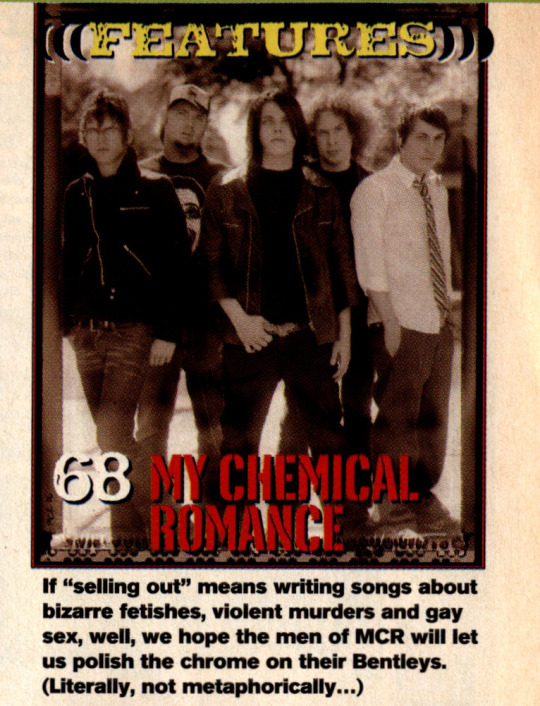
But it’s important to remember that, just as late 90s New Jersey hardcore was not the first subculture with issues of sexual repression, My Chemical Romance does not represent the first attempt to push back at this asexual culture and definitely weren’t leading that particular conversation. Gerard took inspiration from artists already pushing those boundaries and incorporating sexual expression into their art. He has spoken, for example, about the impact of Riot Grrrl acts upon his music and stage presence (Joanna Angel has similarly pointed to bands like Bikini Kill as significant influences). These bands had already incorporated resistance against harmful sexual repression, values which Gerard and his band mates took on when they adopted their styles into My Chemical Romance.
(I also want to mention briefly that other significant people in the hardcore world have spoken out against pornography, such as Ian MacKaye of the formative post-hardcore band Fugazi. MacKaye owned Dischord Records, the definitive underground music label, to which a young Frank Iero unsuccessfully attempted to get his band Sector 12 signed. The matter of pornography and its role within the hardcore world was not one upon which you could maintain a neutral stance after, say, appearing on a porn DVD.)
As shitty as it was that they needed approval from the men in the scene, My Chemical Romance, along with other bands, supported Burning Angel, a new kind of porn, and helped legitimize Joanna Angel’s claim that what she was doing was not backwards or exploitative but had integrity.
Have you had an issue with people you grew up with when they find out you're in the adult industry?
Joanna: At first people had problem[s], but not anymore. Once the cool kids in bands said, "I think what she's doing is cool" all the others turned around. Everyone I ever respected didn't have an issue with it and all the stupid, annoying hardcore kids had a problem. For as much shit as I got, I also got a lot of support. [Source: Hustlerworld Interview: Joanna Angel]
I don’t mean to glamorize the porn industry or to depict Joanna Angel as some savior of female sexuality in the early 2000s. But, as Kathleen Hanna points out, sex work is legitimate work, and sex workers deserve to have workplaces that treat them with dignity and communities that recognize their humanity. The reality was that NJ hardcore as a community did not support sex workers. Fundamentally, these were the barriers that caused Joanna and Burning Angel to make an exodus from the local hardcore scene—and they are the attitudes we risk reproducing when we express discomfort that a band we admire has interacted with a sex worker.
My intentions with this post (which turned out longer than I had ever anticipated, so Jesus, thank you for reading) were to shed light on the historical context of one moment in My Chemical Romance’s history. I’ve found that the average MCR fan, even those with a specific fondness for their early years, doesn’t actually know much at all about it—so I hope this has given some clarity.
I’ll end on this note: Without bands supporting Burning Angel, who knows—we might have never seen the lemon stealing whore. At the very least, the culture surrounding porn would look a lot different. That might not mean it would look better or worse—though you can’t deny the role that Joanna Angel played, nor the role that bands from the New Jersey Hardcore scene like My Chemical Romance played in shaping the American culture of pornography.
Find sources for this post here.
[acknowledgements: thank you so much for reading! my forever thanks, as always, to nic @raytorosaurus, sophia @sendmyresignation, vyn @bringmoreknives, and maddy @8thnotes for their continued cheerleading as i spent over a month writing this long, long post. additional thanks to wes @killrockstar for very kindly offering some incredibly helpful guidance about riot grrrl and sending me resources about kathleen hanna. and much gratitude to merlin @void-flesh and @transmascfrankiero for their feedback on the final draft of this essay.]
2K notes
·
View notes
Text
thinking about how many times i’ve wanted to bring in “low brow” sources in my academic writing, and how such a mode of critique is so fundamentally foreign to the institutions in which i’ve been embedded that i never even considered it a possibility. i once wrote about how beowulf echoes in tolkien’s fiction (primarily using the hobbit to argue that both narratives employ rings) back in high school, but that was an exception because my history teacher was a massive nerd, and tolkien was a well-respected medievalist so the topic didn’t seem far-fetched regardless. but that has very much been an exception for me. i know that film and media studies exploring television, genre fiction, even memes and fandom culture, that there are spheres dedicated to analyzing these “low brow” works of art and social phenomena. but as a comparatist and shakespearean, my area has always been relegated to quote-unquote “high brow,” despite my abiding interest in many “low brow” mediums and artworks.
ANYWAY. this preamble was all to say: how would you guys feel about participating in a zine where we would compile a bunch of essays each exploring a topic through comparing a piece of “high brow” art to “low brow” art? for example, if i expanded on my post using satan and sin in paradise lost to discuss akio and anthy’s roles in utena, or using 19/20th c. existentialist philosophy as a framework through which to discuss adventure time. you could also take a theoretical approach to an internet phenomenon, such as exploring character criticism from a fandom perspective. (these are all ideas for essays i would write if i had the time, so obviously these examples are just templates, not workable suggestions.) this would obviously take a long time to compile and there would be no fixed deadline (i have way too much on my plate at the moment for that anyway), this idea literally just came to me because i was thinking about how fun it could be to work on an online collaborative zine, and how the broader topic could best reflect the discourse of the internet as a collaborative and (ideally) egalitarian realm (for media as well as people). mutuals (or nonmutuals) who are interested, dm me with a description of what you want to write about, and i’ll get back to you with the logistics once i have more of a sense of whether or not this is actually going to happen, and if so, how.
#this is so spur of the moment lmfao i was just reading bao3bei4’s post about zines and was like hey. why not#I think some of you would be really amazing at this#and it wouldn’t have to be long it could be as long or as short as you needed#even just replying to this post to express initial interest#even if you don’t have an idea yet#and there’s no time pressure either#could be fun I think!!!!#o#100#high low zine
188 notes
·
View notes
Text
Thinking about the MHA boys this morning.
Because you just know that their fans speculate on what they're like in bed, especially high ranking heroes like Midoriya and Bakugou.
But what fan theories are the most widely believed? And how close to the truth do they get?
(n-sfw under cut)
Midoriya's fans mostly agree that he's far too sweet and innocent to be anything but vanilla, maybe with a handful of kinks mixed in.
And they're completely wrong.
What would they think if they could see the way he begs to be ruined? If they could see the cheating roleplays? Or the con noncon ones?
When he's asked in interviews how he deals with the stress of being a hero, he always says that he relies on his partner and spends time with them.
He's always got a little happy blush on his face, and those moments always get turned into gifs for his fans to squeal about how cute he is.
If only they knew what kind of 'spending time with his partner' he was really thinking about.
///
Bakugou has one of the horniest fanbases ever.
He's an aggressive, caring, tsundere who keeps his private life as secret as possible, so it was bound to happen.
Countless thirst edits of him exist for fans to drool over and debate what dominant, kinky things they want him to do to them.
Bakugou's fans are also wrong.
Because he's very vanilla. He resents the super dom image his fans and the media sometimes use, because he's not into any of that shit.
It makes him feel pretty bad to imagine himself hitting or tying up his fans or anyone. He's just not that person.
Bakugou's whole shtick is passionate sex between equals. His alpha and him fuck a lot, but they bask in each other's presence and bodies. He's not really into toys or BDSM or that shit.
He wants to keep his life private, and unfortunately part of that is never addressing the wild speculation that the fans fill the gaps with.
///
Denki though? His fans know exactly who he is in bed, there's no secret there.
His Tiktok is filled with all sorts of couple shit that make his relationship dynamic very clear.
He's not a big hero either, so the fans he does have are small in number, but particularly devoted.
He also makes 'jokes' in interviews and on Twitter that reveal a lot.
His fans know he's getting his back blown out by his alpha every night.
They know he likes getting choked.
They know he likes the ditzy house spouse vibes.
It's an open secret that everyone memes constantly.
Denki thinks it's funny most of the time, but he has been embarrassed by it on occasion.
Idk, I have to go back to writing my essays now, but I needed to push this out into the internet first ;)
#headcanons#bnha#mha#a/b/o#omegaverse#denki#bakugou#midoriya#dom!reader#dom reader#hcs#alpha!reader#n-sfw
462 notes
·
View notes
Text
on authenticity
My mood in the recent months keeps going from bad to worse. Today I randomly fell into the rabbit hole of checking out other patreon artists, which always grounds me in reality and cheers me up, perhaps in a weird way. Essay incoming \o/
Authenticity is a blob of a word that sounds almost pretentious nowadays. It gets sneered at. You either sell your soul, or you don't earn with your art.
What's authentic, being true to yourself, will vary from person to person. It's like a sliding scale of suffering that you will tolerate in exchange for a coin, while convincing yourself that you have fun.
The harsh truth of modern world is that if your art pays for your living, you've already reached success, no matter how you may feel about the type of content you actually make for that money. Insert the meme furry nsfw art here. Or not furry. Or even sfw, but comms, lots of comms every month. Or merch. Anything that sells. Products first, art second.
Marrying passion and profession is virtually impossible, yet I'm doing it, only thanks to your support. I'm acutely aware that, even as I choose to be "real" and talk about an artist's money-making in a raw way, it's still patreon talk, and yes, I'll plug the link as well, so technically this entire post is an ad *fingerguns*
I just feel so privileged being able to create whatever the fuck I want, literally, I take no comms/requests/guidance on what and how should I draw/write, I post experimental, sometimes provocative stuff, and still make enough to survive. This sole fact should get me through the day, whatever other struggles I may be facing currently (I am. I don't wanna talk about it rn, instead I distract myself with this text), I should always remember the unique place in life I managed to carve for myself.
There are madmen (gender-neutral) who toss $10-20 at me every month. The majority "only" pledges $1, the notorious tier that gets treated as a tip jar with no rewards by many other creators. All of my rewards are the same at $1 and $20 (save for the one-time digital artbook download at $10, just to be perfectly clear), it's a conscious choice and a risk I continue taking because it's how I am. I used to split rewards between tiers in the past, before xiv, and it was a lot of busy work while it made me treat my art less as art and more as product. This pic goes into the cheap box, this pic goes into the expensive box. Every month. It's. Definitely not for every artist.
Logistic hell of splitting and delivering rewards, different posts with less comments per post, also my discord roles/channels would have to be split, nowadays it's just patron, whether you give me $1 or $20, there's no visual disparity, you're hanging out in the same cool kids' club, and collectively making happy noises on Fragments Fridays.
Could I be making more money if I got rid of the $1 tier? Yeah. But, mercifully, after 2 years I don't need to. I legit make enough currently, my only worry is to keep what I have. Patrons don't stay forever, 2-5 people would leave every month, about the same number would join (hence my patreon ads, I need to keep people reminded of it, even if it makes me feel guilty every damn time). I did Research (tm) in the past to find out that my "bleeding" numbers are below average, i.e. it's good, people generally tend to stick around.
I put a lot of emphasis on the $1 because I'm kinda proud of what I managed to accomplish while staying self-detrimentally humble. Literally doing an impossible thing in a world that keeps burning down. So yeah if you've been feeling bad for only giving me $1, what matters is that there's enough $1s to make a difference. Together you're creating a phenomenon, and you should be proud.
There are many stupid little principles, hills that I'll die on, that make up my authenticity. I chose to speak of it here and now in order to sorta sell myself, so it feels hypocritical x'D But if I don't shine a spotlight on this, who will. I'm old and jaded and increasingly terrified of how insincere the internet's becoming. Everything's fake, sugarcoated, polished for sale. My art's always been a scream of defiance against all that, now that I'm more or less established, I wanna scream louder. Thanks for hearing my screams. You can scream with me too if you want.
71 notes
·
View notes
Text
I appreciate how open FR Staff is being about this mess but as a writer I have so many questions as to how it got to this point.
I understand not wanting to rapidly expand the team but when you hit an event like BotE and you don't have everything written at launch you gotta look around at some point and go "are we biting off more than we can chew"
The 3 to 5 page limit on stories I'm sorry what are we, in Intro to Creative Writing? I understand an upper limit so a whole novel isn't written but like, that's a limit of ~2500 words single spaced, or, since we're apparently turning in essays 1250 words double spaced (so says google and I'm just to flabbergasted to check).
The lore not being something we can engage with until Adventure Mode. I say this affectionately but this is beginning to look like that meme (staff: "Adventure mode. Save me Adventure Mode. Adventure Mode save me.")
They were all just... doing it? I understand it is a small team and the multiple hats but see point 1. Also like, hello?!? Writing is no less of an art than well, art and like... I own Undel's how to draw dragons books. I could follow them step by step and my dragons would not be identical to hers. Similar but not the same, why would writing be different what are youndoing no wonder there's little tonal consistency.
Really my conclusion is they should've hired a dedicated lore writer years ago. (Full disclosure, when I was in college I was desperately hoping they would open the position, I would've loved to have applied but they never did... see point 4 again.)
Like much much too late now but a dedicated lore writer could've done a lot and helped with the energy high following BotE because people liked the stories, and I think more lore consistently, even if it was just short stories once a month, might've been appreciated. Especially as Adventure Mode continues to not come out and Tidelord is still missing and we had such curiosity but nowhere to direct that energy.
Like, people who know nore than I have spoken about the issues with the Auraboa article. I'm just weighing in as a writer and player, that the way they go about releasing and writing the lore also leaves a lot to be desired
63 notes
·
View notes
Text
Why I'm Not Allowed On Twitter Unsupervised Any More: A Photo Essay

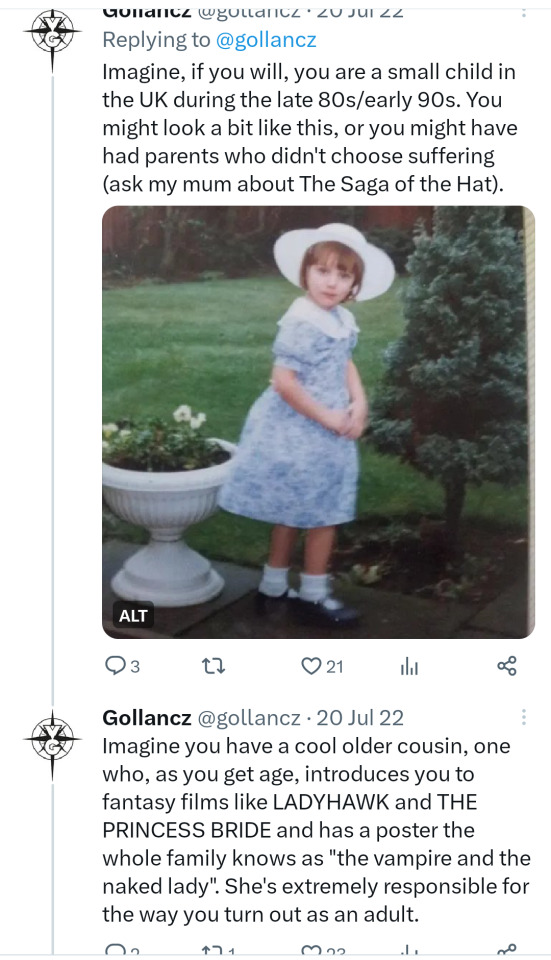

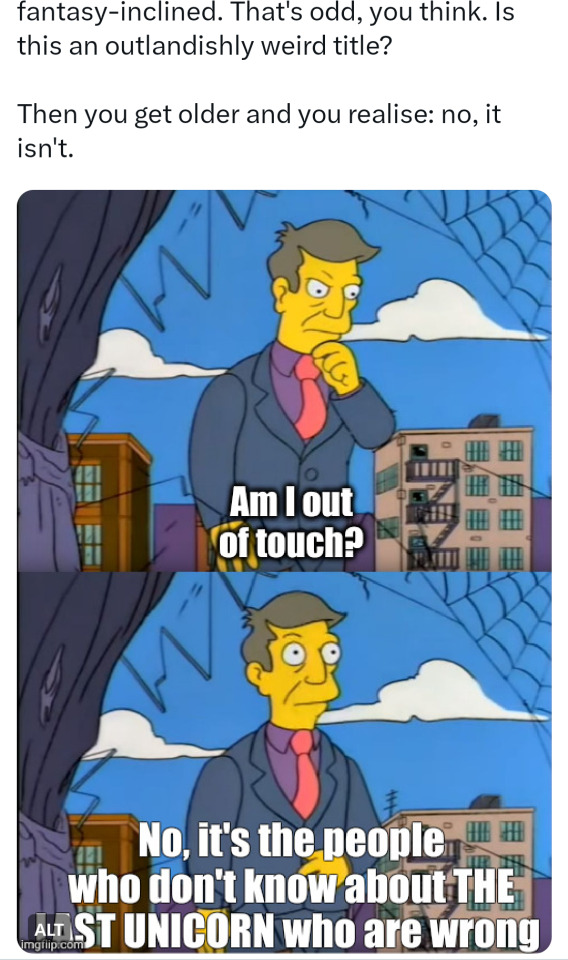
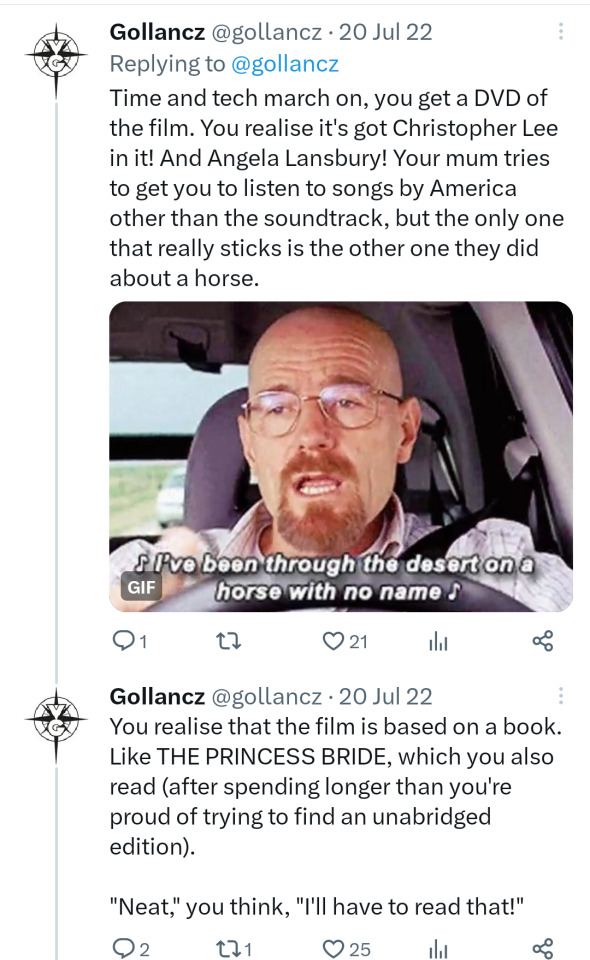
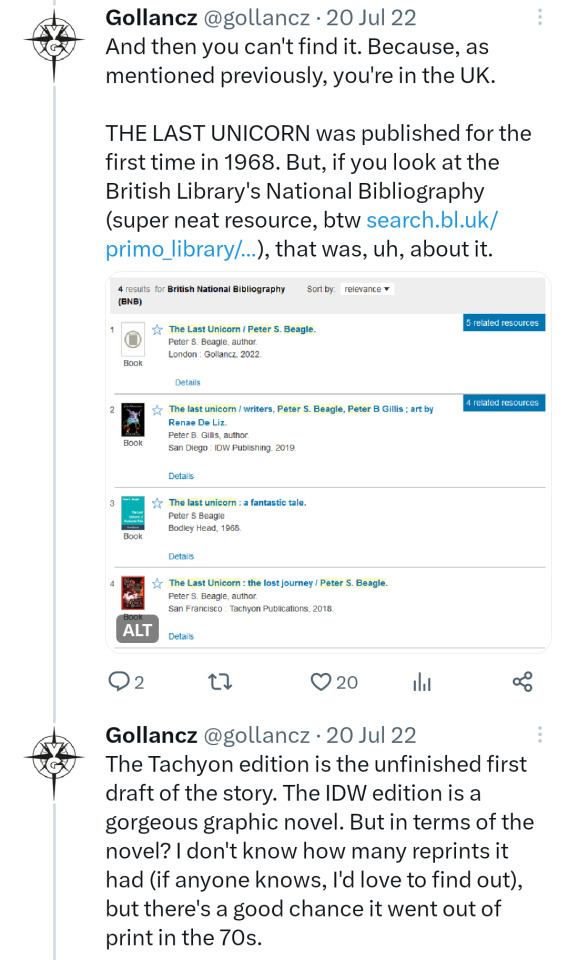
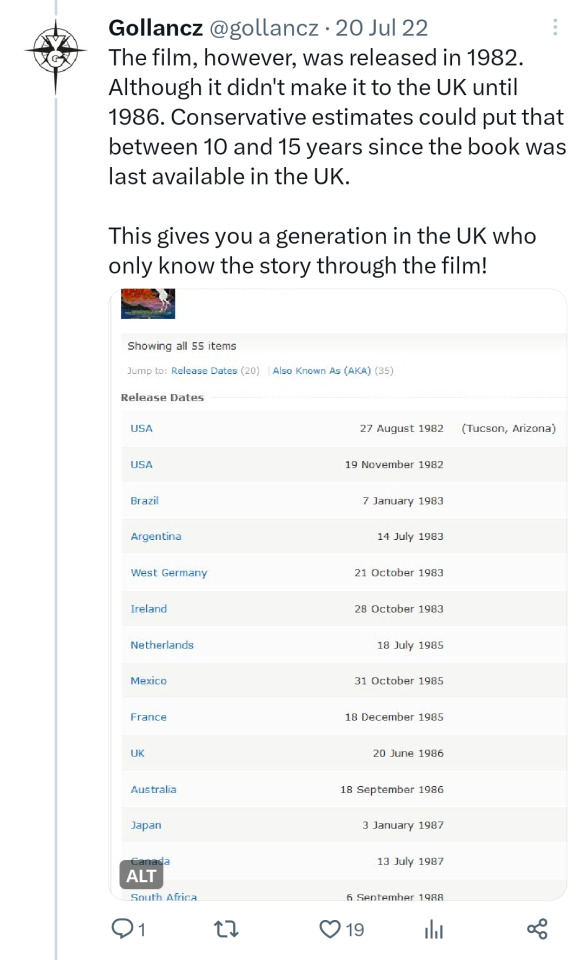





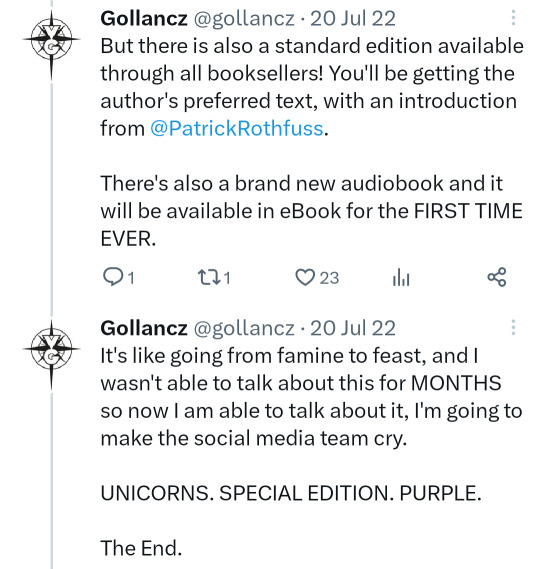
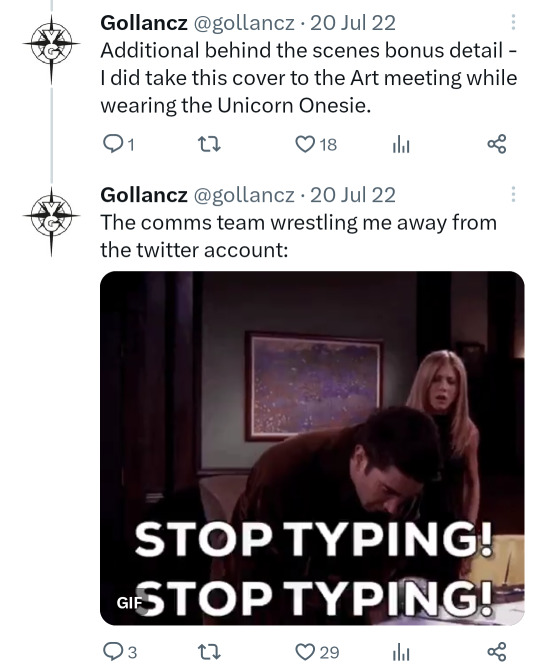
Key Notes:
Since this was posted I discovered that the books had briefly been available in the UK under the name Peter Beagle rather than Peter S. Beagle in the mid-90s, which is why they didn't show up on the British Library search
The article by Tor.com @torbooks: Peter S. Beagle Has Finally Regained the Rights to His Body of Work
If you want our gorgeous limited edition, I believe there are still a handful left (except for the US and Canada, sorry lads), and you can get it here. I'm not kidding when I say I got a little teary-eyed when these showed up.
[Image Description: A tweet thread from the Gollancz twitter dated 20th July 2022, which goes as follows -
Tweet 1: You may have seen that we're printing a Brand New Edition of The Last Unicorn. We're very excited! I was asked to tweet about it. I wasn't asked to do it quite like this, but I also wasn't asked NOT to do it like this, and I have the twitter login so whose fault is that? (Thread emoji, and gif from the film Scream reading 'The Call is coming from inside the house!')
Tweet 2: Imagine, if you will, you are a small child in the UK during the late 80s/early 90s. You might look a bit like this, or you might have had parents who didn't choose suffering (ask my mum about The Saga of the Hat) (an image of a small girl approximately 3 years old wearing a blue dress and a big white hat)
Tweet 3: Imagine you have a cool older cousin, one who, as you get age, introduces you to fantasy films like Ladyhawk and The Princess Bride and has a post the whole family knows as 'the vampire and the naked lady'. She's extremely responsible for the way you turn out as an adult.
Tweet 4: One year, for your birthday, this cousin buys you a video. It's the first video that is yours, not to share. It has a bright yellow cover. The butterfly scares you. But you watch it on a loop. You don't realise how special it is, but it's a seed that burrows into your brain. (An image of a VHS of The Last Unicorn)
Tweet 5: A decade or so later, in your teens, you rediscover it. None of your friends have heard of it, despite also being fantasy-inclined. That's odd, you think. Is this an outlandishly weird title? Then you get older and you realise: no, it isn't. (Principal Skinner meme reading 'Am I out of touch? No, it's the people who don't know about The Last Unicorn who are wrong')
Tweet 6: Time and tech march on, you get a DVD of the film. You realise it's got Christopher Lee in it! And Angela Lansbury! Your mum tries to get you to listen to songs by America other than the soundtrack, but the only one that really sticks is the other one they did about a horse. (Gif of Walter White from Breaking Bad singing along to Horse With No Name)
Tweet 7: You realise that the film is based on a book. Like The Princess Bride, which you've also read (after spending longer than you're proud of trying to find an unabridged edition). 'Neat,' you think, 'I'll have to read that!'
Tweet 8: And then you can't find it. Because, as mentioned previously, you're in the UK. The Last Unicorn was published for the first time in 1968. But, if you look at the British Library's National Bibliography (super neat resource btw), that was, uh, about it. (screenshot of the search results from the National Bibliography showing four editions of The Last Unicorn by Peter S. Beagle, one from Gollancz in 2022, one from IDW in 2019, one from Tachyon Publications in 2018, and one from Bodley Head in 1968)
Tweet 9: The Tachyon edition is the unfinished first draft of the story. The IDW edition is a gorgeous graphic novel. But in terms of the novel? I don't know how many reprints it had (if anyone knows, I'd love to find out), but there's a good chance it went out of print in the 70s.
Tweet 10: The film, however, was released in 1982. Although it didn't make it to the UK until 1986. Conservative estimates could put that between 10 and 15 years since the book was last available in the UK. This gives you a generation in the UK who only know the story through the film! (A screenshot of the IMDB page showing the different release dates for The Last Unicorn around the world)
Tweet 11: The screenplay was written by Peter S. Beagle, and made by the legendary animation directors Arthur Rankin Jr. and Jules Bass. That's right, the guys behind Thundercats and 2 out of the 3 films based on The Hobbit and The Lord of the Rings.
Tweet 12: The Book has been in print in the USA (and possibly all of North America) constantly since its publication, so it seems baffling that people in the UK haven't heard of it. As the internet became more prominent, however, it became easier to just... import a copy of the book.
Tweet 13: But! This also isn't quite as simple as you think. You see, until last year the rights to The Last Unicorn were tied up in legal limbo. And the US edition of the book contained changes that Peter wasn't happy with. (Link to the Tor.com article about the rights)
Tweet 14: Back to you, the 80s/90s kid, who is now an adult, happy that unicorns are A Thing again and you're living your best life. You're very easy to buy presents for. Your partner despairs of unicorns. You get a job working in books about magic and space. (unicorn emoji and photograph of a collection of unicorn memorabilia, including three different versions of The Last Unicorn)
Tweet 15: You mention that one day you would like to publish The Last Unicorn. That if you did, you would like to do a really beautiful edition of it. And you would like it to be purple. Because since the film is what you know, you associate it with purple.
Tweet 16: And, after taking a very circuitous route, here we are! This is the original text, that was first published in 1968. Reading it after you have only seen the film is the strangest experience - like being introduced to a very dear friend that you have never met before.
Tweet 17: Peter's screenplay kept the voice of the story so well, you can hear the characters when you read the book. But now there's so much more depth, softness and warmth to it. The butterfly doesn't seem so scary any more. And, it's beautiful. And it's purple. (Image of a hardback edition of The Last Unicorn, with a black base, purple background, and a linocut image of the unicorn in her wood. On the black cover underneath is a foiled unicorn with the moon and butterfly, the page edges are sprayed purple, and the endpapers are black with silver butterflies)
Tweet 18: Anyway, I've taken you on a three day trip that could have been done in a single tweet, but that's what happens when you let me drive. This edition is the limited exclusive one only available through the Gollancz Emporium and you can preorder here: (link to Gollancz Emporium)
Tweet 19: But there is also a standard edition available through all booksellers! You'll be getting the author's preferred text, with an introduction from Patrick Rothfuss. There's also a brand new audiobook and it will be available in eBook for the first time ever.
Tweet 20: It's like going from famine to feast, and I wasn't able to talk about this for months so now I am able to talk about it, I'm going to make the social media team cry. UNICORNS. SPECIAL EDITION. PURPLE. The End.
Tweet 21: Additional behind the scenes bonus detail - I did take this cover to the art meaning while wearing a unicorn onesie.
Tweet 22: The comms team wrestling me away from the twitter account: (gif of Ross from Friends shouting 'Stop typing! Stop typing!')
End ID]
384 notes
·
View notes
Text
I saw this slightly-old post making the rounds recently by former alt-right memelord Walt Bismark, on how the alt-right "won" in the late 2010's - positing that as the cause of why it generally vanished. I agree overall with the vanishing part, its not gone-gone ofc but it waned as a cohesive movement. But I saw a lot of people (and generally not alt-right figures) agreeing with its conclusion and I am a bit more skeptical of those.
Its largely a personal essay so I wont address most of it, but it has a summary of five main points that outline essentially "the agenda of the Alt Right at the beginning" to evaluate success upon. Bismark thinks they won on all five, but overall I think this is playing a trick of inventing an enemy to claim you defeated. Anyway, the points:
1: Shift the “Overton Window” of acceptable public discourse to make it politically viable to openly discuss the interests of white people in mainstream politics, in the same way black people or Jewish people discuss their collective interests.
This one I will grant a partial victory - there was a legitimate intensification of "white as identity" in politics, a making explicit what was implicit in the 2010's. Now ofc I consider this to be a classic horseshoe moment; the hard left at the time was also extremely interested in abandoning race neutrality and valorizing racial identity as an organizing principle, and did it in a very ham-fisted way that the right capitalized on, so it was an easy battle to win - but that is what it is, ofc the wider environment defined the goals & strategy. I mention it however because I do think this is only partial, and the gap between implicit and explicit isn't that relevant. He mentions as an example of this success:
Affirmative action was of course squashed by SCOTUS and the necessary legal infrastructure is being deployed to burn it down. Mainstream conservatives are mobilizing a lot of resources and energy to this end.
But conservatives have been fighting affirmative action for 20+ years, easily. Here is a 1999 article on precisely such a campaign, I literally just googled "conservatives affirmative action [year]" and I get results each time, 2003 had big cases (the Bollinger cases) on AA, etc. I remember "affirmative action bake sale" memes from like 2006 at my uni! What changed between Bollinger and 2023's Students for Fair Admissions v. Harvard is that conservatives had just had enough time to stack courts, and wait for Supreme Court justices to die. That just...takes time to do! The strategy hadn't changed between 2003 and 2023. And meanwhile, did they win? They won that court case, sure. What do you...think the ethic makeup of the next Harvard class is gonna be? Wanna take some bets?
His other listed victories are things like:
"Vivek defended the Great Replacement Theory on national television and remained a major Trump surrogate. The SPLC would have marginalized him for that 10 years ago. Today because of polarization and MAGA closing ranks they can’t do shit."
And like, the Southern Poverty Law Center would have successfully marginalized a Republican politician in idk 2003 are you completely high right now? Strom Fucking Thurmond was an active Senator in 2003! This is the repeated tactic here, the imagined enemies - there was never a time where liberal institutions could consistently force conservative politicians to kowtow, so you can't claim it as a change.
This is why I mention the social justice horseshoe, because he has this point here:
These days you can complain about quotas etc. being unfair to you as a white man and it’s not inflammatory or low status among centrists and conservatives. Even non-woke liberals won’t really hate you for it, just quietly think you’re a bit of a chud. This was not the case in 2015.
And this is partially correct, I agree there was some norm shift. But that is because in ~2010 there really weren't any quotas against white men, it wasn't a thing almost anywhere outside of university applications, so the complaint would make no sense. What happened was that starting in ~2012 a huge left cultural movement started that just openly supported active discrimination against whites, Asians and men. They were a small minority of course, and never had much power, but they got enough power in certain institutions like non-profits and universities that there was a string of just very obvious cases of clear racial discrimination against in particular whites & asians (both men and women, white women often got it very bad in this wave). And the large majority of people just saw that and went "uh yeah racism is still bad?" and so now you can say that because its actually relevant to say. From that lens, is this a successful cultural victory on the part of the alt-right? In some sense sure, but really its more a cultural failure of the hard left. The status quo just kept on chugging along.
Ugh that point went long, the others repeat so we will go through them quicker.
2: Elevate identity issues like anti-immigration and the promotion of traditional gender norms to the center of Republican politics.
A fake enemy here - anti-immigration was already a huge issue for Republicans in the 2000's. It had a huge wave under Obama actually, it goes in cycles like that. And it responds to material conditions; it's a big issue again right now because the immigration numbers spiked massively under Biden, its just way worse of a problem now (primarily due to the booming economy of course). Again a partial victory for the first part, I agree its more salient due to Trump platforming it, but I'm skeptical that it is a big shift - people are memory-holing the Tea Party movement really badly here for example.
And the second point is just obviously false, Republicans always cared about that, and they care about it less now, giving up the ghost on gay marriage for example. The Alt-Right coincided with a decline of the influence of the Religious Right, and it shows on this issue, 0 points.
3: Make it socially acceptable to discuss HBD and the resulting moral implications for leveling mechanisms like affirmative action.
Peak "log off" moment, it was always acceptable to discuss this outside of liberal/professional circles and there it still isn't acceptable to discuss it. Charles Murray wrote the Bell Curve in 1994 and his been an American Enterprise Institute Scholar for this entire span of time. This is confusing churn for change - the mid-2010's had a bunch of big, mainly online fights about HBD, and then everyone just sort of moved on with the status quo pretty much unchanged. Nothing like education policy, even in Republican circles, has shifted over this.
4: Convince conservatives to stop ceding moral authority to liberals and allowing them to determine who on the Right is verboten or beyond the pale. Make it unacceptable among conservatives to “punch Right” or purge people for wrongthink.
Sigh, again when have Republicans ever ceded moral authority to liberals? Harvard University could not condemn Newt Gingrich in ~2009 and make him change his mind about anything. And "Republicans don't self-criticize while Liberals eat themselves alive" has been a complaint for literally decades, you would hear that as far back as say Clinton and things like the 1999 WTO protests. Its both true and exaggerated - the Tea Party primaried Republican candidates for wrongthink in 2010, and Trump did the same thing! With disastrous results for the Republicans in 2022. I really, really don't think you can look at Trump's Republican party and say they solved the Wrongthink problem.
5: Expose and dismantle the hypocritical attitude that allows neocons to militantly support Israeli ethnonationalism while brutally repressing any white identity politics domestically.
This one is just a lolwut moment, "brutally repressing any white identity politics domestically", like what does that even mean? Name the concrete policy proposals George Bush implemented in 2007 than Donald Trump didn't in 2018 around this topic. Again a fake enemy, they were never repressed by the right, and ofc are still hated by liberal institutions like universities.
Moving on from any specific point, I think its very telling that very little about free trade vs protectionism or isolationism/support of autocracy abroad enters this list. Because beyond immigration those are the big shifts the Trump movement (which is the mechanism the alt-right has to claim for making its impact) has ushered into the party. They didn't change its stance on sexual politics or "race & IQ" or anything, those haven't changed, but meanwhile the party has completely flipped on things like tariffs or opposition to Russian military expansion. But of course those don't align neatly at all with the issues the Alt-Right fought about in 2015.
The reality the Alt-Right can't escape is that they used Trump as their mechanism for change, and Trump never really cared about any of their goals beyond immigration. He used them and then pursued either bog-standard Republican policy or his own mercurial, autocratic whims, eventually channeling all of this energy into election denialism. I really don't think if you pulled aside frikkin Ryan Faulk in 2014, asked him to put down his graphs about Raven's Progressive Matrices of black Caribbean students, and said "Hey 10 years from now all of this energy is being channeled into pretending that a failed real estate mogul didn't lose the 2020 presidential election", that he would look at that outcome and think Mission Accomplished.
I don't want to fully oversell, there are for example wins Bismark doesn't mention (School choice comes to mind, the biggest conservative win of the past decade besides the protectionist swing). The Alt Right was an influential movement, it earned its place in history. But I do not think it is an example of being a "victim of its own success". I think instead it should be understood as part of the "radical froth" of the 2010's, that bubbled over and then evaporated like its more intense leftwing peers did. It made some mark and then got left in the dust.
Net ranking of the 5 points: 0.5 for Point 1, 0.25 for Point 2, 0 for the rest, 1.25/5.
67 notes
·
View notes